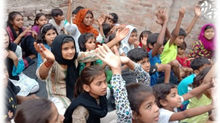Maybe there's still hope.
- Beverly Van Kampen
- Jun 16, 2020
- 2 min read
Life among the minority religions in Pakistan is difficult all the time. Jobs are scarce and low-paying. Good education is a dream, not often a reality. And families often face troublesome health issues. That is the basic day-to-day living for many people in this often-distressed country. And, for women, these problems are sometimes compounded.

Today we want to tell you about two beautiful Pakistani women who face great challenges:
The first is a widow - not an unusual circumstance in a country with a life expectancy of only about 67 years. Her husband died young, though, leaving her with four children to care for. Without an education, she is classified as a domestic worker, helping out in homes of those better off so she can make enough money to feed her children. With COVID-19 on the scene, householders are hesitant to have others in their homes, so the work has been non-existent. With the help of RTN and Manzoor's Islamabad team, she has food for her family for the next few weeks. Maybe by then, her former employers will be ready to have her come back to work.

The second also is a domestic worker, much as the widow introduced above. She, too, has a family to care for - six children - and her situation is even more stressful because her husband is in prison. Most days it seems hopeless, but after she was given a month's worth of food at the end of May, she visited her husband and said to him, "Maybe there is still hope for us."
A little help translates to a little hope for those who have nowhere to turn in their time of need.
_edited.jpg)



































Comments